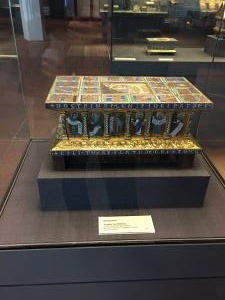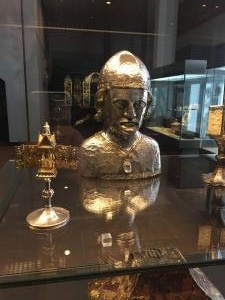The U.S. Court of Appeals for the D.C. Circuit today dismissed the petition to rehear en banc last year’s landmark ruling that the heirs of the art dealers who sold the Guelph Treasure (or Welfenschatz) may pursue their claims in U.S. federal court. Defendants the Federal Republic of Germany and the Stiftung Preussischer Kulturbesitz (the SPK, or Prussian Cultural Heritage Foundation in English) had argued that claims under the Foreign Sovereign Immunities Act’s expropriation exception such as these are not violations of international law and also require a claimant to exhaust remedies abroad, a position rejected by prior decisions of the D.C. Circuit and by today’s ruling as well.
Today’s decision confirms the first-of-its kind holding last year that a German state museum must face claims based on allegations of Nazi-looted art, a direct result of Germany’s failures through its so-called Advisory (often called Limbach) Commission to address seriously and comprehensively the state of Nazi-looted art in its national collections. In the five years since denying the Guelph Treasure claimants any meaningful attention, Germany has fumbled through the Gurlitt fiasco and attempted other various distractions like its new fitful attention to colonial art (with no real progress there either). Germany has repeatedly disparaged my clients by suggesting that the matter was already "decided on the merits" before Germany's Advisory Commission. This is false. The Advisory Commission renders non-binding recommendations to state museums and has been roundly criticized for its opinions in 2014 and 2015 in particular, when my clients were denied justice. There is no small irony in having to explain this in the context of Germany's request for a do-over after last year's ruling.
Read More
Topics:
Third Reich,
Feist,
Prussia,
Germany,
Nazi-looted art,
Foreign Sovereign Immunities Act,
SPK,
Advisory Commission,
Stiftung Preussischer Kulturbesitz,
Hermann Goering,
expropriation exception”,
Nazi persecution,
Boy Leading a Horse,
NS Raubkunst,
J.S. Goldschmidt,
Prussian Cultural Heritage Foundation,
forced sale,
Zacharias Hackenbroch,
Welfenschatz,
I. Rosenbaum,
Holocaust Expropriated Art Recovery Act,
HEAR Act,
Paul Körner,
Staatliche Museen zu Berlin,
Kunstgewerbemuseum
(WASHINGTON-July 10, 2018) The U.S. Court of Appeals for the D.C. Circuit has affirmed the right of the heirs to the so-called Guelph Treasure (known in German as the Welfenschatz) to seek restitution in U.S. courts for the value of the treasured art collection. The appellate court rejected Defendants’ arguments that U.S. courts lack jurisdiction, or that Germany’s treatment of its Jews in the 1930s should be immune from judicial scrutiny. While the Federal Republic of Germany itself was dismissed as a defendant, the actual possessor and key party in interest (the Stiftung Preussischer Kulturbesitz, or SPK) must now prove that a 1935 transfer of the collection by a consortium of Jewish art dealers to Hermann Goering’s minions was a legitimate transaction if they are to retain the collection.
Read More
Topics:
Gestapo,
Z.M. Hackenbroch,
Prussia,
Germany,
Nazi-looted art,
Foreign Sovereign Immunities Act,
Markus Stoetzel,
Mel Urbach,
SPK,
Hermann Goering,
FSIA,
NS Raubkunst,
Sullivan & Worcester LLP,
J.S. Goldschmidt,
Adolf Hitler,
Nicholas M. O'Donnell,
Welfenschatz,
I. Rosenbaum,
D.C. Circuit,
Consortium,
Genocide Convention,
Reichstag,
flight taxes,
Baltimore Sun,
Luftwaffe
A federal appeals court has upheld the growing consensus that the Foreign Sovereign Immunities Act (FSIA) confers jurisdiction over foreign state actors in possession of art allegedly looted by and/or overseen by the Nazis. Upholding last year’s District Court decision, the U.S. Court of Appeals for the D.C. Circuit affirmed the ruling in De Csepel v. Republic of Hungary that denied several Budapest museums’ motion to dismiss, while allowing the Republic of Hungary itself out of the case. This is the heirs second successful trip to the appellate court, where their claims were upheld in 2013. The case is the subject of a chapter in my newly-released book A Tragic Fate--Law and Ethics in the Battle Over Nazi-Looted Art (ABA Publishing).
Read More
Topics:
Berlin,
David de Csepel,
Angela Maria Herzog,
Thyssen-Bornemisza Collection,
Foreign Sovereign Immunities Act,
Baron Herzog,
Budapest University of Technology and Economics,
Hungarian National Gallery,
SPK,
Stiftung Preussischer Kulturbesitz,
Budapest Museum of Fine Arts,
FSIA,
expropriation exception”,
Cassirer v. Kingdom of Spain,
Federal Republic of Germany,
András Herzog,
Welfenschatz,
genocide
News Accompanied by Deafening Silence About Ongoing Restitution Policy Failures
The German government announced recently that it had returned an additional work of art found in the Salzburg home of Cornelius Gurlitt in connection with the 2013 revelation of Gurlitt’s trove of art originally in the possession of his late father Hildebrand. La Seine, vue du Pont-Neuf, au fond le Louvre by Camille Pissarro (1902) has been returned to the heirs of Max Heilbronn, from whom it was taken in 1942 in France. The accompanying announcement was of a piece with the ongoing fiasco of the Gurlitt affair: a press release touting the personal involvement of Germany’s Minister of Culture Monika Grütters, a self-serving but vague statement about commitments to restitution, and absolutely no explanation or update about what is happening to the hundreds of additional paintings and objects under investigation. The press release was also sure to mention an upcoming exhibition of Gurlitt collection works later this year. In sum, the announcement confirms precisely the opposite of its intended effect.
Read More
Topics:
Cornelius Gurlitt,
Germany,
Nazi-looted art,
Washington Conference Principles,
Hildebrand Gurlit,
Gurlitt,
NS Raubkunst,
Kunstmuseum Bern,
Monika Grütters,
Taskforce Schwabinger Kunstfund,
Welfenschatz,
Minister of Culture,
Gurlitt Taskforce

The decision on Friday to allow our clients’ claims to proceed against German and the Stiftung Preussischer Kulturbesitz for the restitution of the Guelph Treasure (or Welfenschatz) is ground-breaking in important respects, and a welcome part of a consistent progression in the law of sovereign immunity over claims for Nazi-looted art. As we noted in our initial reaction, it is the first decision in which a U.S. court has held that it has jurisdiction over Germany or an agency or instrumentality of it under the Foreign Sovereign Immunities Act (FSIA) for a claim to Nazi-looted or purchased art—though others have certainly tried—in this case finding the so-called expropriation exception applies. Critically, it recognizes that claims about forced sales in the early days of Nazi persecution indeed create jurisdiction. Moreover, the court agreed with our clients that Germany’s various excuses to avoid litigating the substance of a forced sale involving Hermann Goering based on pleas for deference or respect to the flawed Advisory Commission are no reason to dismiss the case.
Read More
Topics:
Germany,
Nazi-looted art,
Foreign Sovereign Immunities Act,
SPK,
Advisory Commission,
Stiftung Preussischer Kulturbesitz,
Hermann Goering,
FSIA,
Preemption,
expropriation exception”,
NS Raubkunst,
sovereign immunity,
Welfenschatz,
HEAR Act
Under Landmark Ruling, Germany Must Now Defend Nazi-Looted Art Claims in U.S. Court
WASHINGTON (March 31, 2017)- The United States District Court for the District of Columbia has ruled that claims over the famed Guelph Treasure can proceed against Germany in a United States court. This is the first time Germany will have to defend itself in the U.S. against allegations of looted Nazi art and artifacts. The claims arise out of the 1935 forced sale by a consortium of Jewish art dealers to Hermann Goering’s minions of the famed collection of medieval artifacts known as the Guelph Treasure. The claims were filed by clients of Sullivan & Worcester LLP against the Federal Republic of Germany and the Prussian Cultural Heritage Foundation (the Stiftung Preussischer Kulturbesitz, or SPK). The court rejected the Defendants’ arguments that they are immune from suit and held that the Plaintiffs’ claims can be considered a taking of property in violation of international law for the purpose of evaluating the court’s jurisdiction over Germany and the SPK.. Jed Leiber, Alan Philipp, and Gerald Stiebel may now proceed to litigate their claims for their property’s rightful return. Leiber, Philipp, and Stiebel are also represented by S&W’s co-counsel in this matter, Markus Stötzel and Mel Urbach, experienced counselors in the return of Nazi-looted art who have been fighting this case for over eight years and who decried Germany continuing to defend the Nazis’ and Herman Goering’s theft from Jews.
Read More
Topics:
Nazi-looted art,
Foreign Sovereign Immunities Act,
Mel Urbach,
SPK,
Stiftung Preussischer Kulturbesitz,
Hermann Goering,
FSIA,
expropriation exception”,
NS Raubkunst,
J.S. Goldschmidt,
Markus Stötzel,
Saemy Rosenberg,
Adolf Hitler,
Federal Republic of Germany,
Zacharias Hackenbroch,
Nicholas M. O'Donnell,
Welfenschatz,
I. Rosenbaum,
Paul Körner,
Wannsee Conference

With reports that Russia is considering abandoning the nearly five year old embargo on loans of cultural artifacts into the United States, the cited connection between that willingness and the recent passage of the Foreign Cultural Exchange Jurisdictional Immunity Clarification Act (FCEJICA) bears closer scrutiny that it has received to date. If the unnecessary embargo were to come to an end it would be welcome news, but Russia’s claim that the new law is the reason is hard to square with the history of the issue. It cannot be stated emphatically enough that the new law makes Russian art loans no more or less safe from seizure than they were before, because the law governing seizure of cultural objects (the Immunity from Seizure Act, or IFSA) has not changed. Russia’s penchant for framing the question as something for which it needed protection is thus frustrating because it is simply incorrect. The Russian loan embargo has been political theater from the time in began in 2012 in retaliation after Russian defendants lost a key litigation in Washington, DC, and the new law was passed in response to events that had nothing to do with Russia.
Read More
Topics:
Alfred Flechtheim,
Russia,
22 U.S.C. § 2259,
Foreign Sovereign Immunities Act,
28 U.S.C. 1605(a)(3),
FSIA,
IFSA,
Immunity from Seizure Act,
Chabad,
Welfenschatz,
Malevich v. City of Amsterdam,
Foreign Cultural Exchange Jurisdictional
Congress has passed and President Obama is expected to sign two bills related to looted art and the availability of U.S. courts to hear disputes over them. The Holocaust Expropriated Art Recovery (HEAR) Act of 2016 and the Foreign Cultural Exchange Jurisdictional Clarification Act (FCEJCA, for lack of a handy acronym) were both passed without objection both the House of Representatives on December 10, 2016, and are expected to be signed by President Obama shortly. The HEAR Act is a major shift in the law of Nazi-looted art claims specifically, while the FCEJCA is controversial but unlikely to have a broad impact one way or another. It is perhaps most remarkable that in an era of unique partisanship and political polarization, members of Congress from both parties and the President agreed on anything, let alone unanimously (sponsors include such unusual allies as Ted Cruz, Richard Blumenthal, John Cornyn, and Charles Schumer).
Read More
Topics:
Legislation,
Alfred Flechtheim,
Russia,
Nazi-looted art,
Foreign Sovereign Immunities Act,
22 U.S.C. § 2459,
FSIA,
expropriation exception”,
NS Raubkunst,
Restitution,
World War II,
State Hermitage Museum,
Charles Schumer,
Immunity from Seizure Act,
Chabad,
28 U.S.C. § 1605,
John Cornyn,
Welfenschatz,
Holocaust Expropriated Art Recovery Act,
Richard Blumenthal,
Ted Cruz,
Foreign Cultural Exchange Jurisdictional,
Mikhail Piotrovsky,
Politico,
Anita Difanis
We filed yesterday the opposition to the motion to dismiss my clients’ claims over the 1935 forced sale of the Guelph Treasure, or Welfenschatz. The motion was filed two months ago by defendants Germany and the Stiftung Preussischer Kulturbesitz. As we noted when Germany first moved to dismiss the complaint last fall, Germany’s arguments were revisionist and alarming in a number of troubling ways, most seriously because they tried to excuse persecution of Jews before an arbitrary date as an internal affair not subject to U.S. court jurisdiction, and because it repudiated Germany’s international commitments under the Washington Principles to address restitution claims on the merits. The abject failure of the Advisory Commission, which Germany tries to portray here as some sort of arbitration (which it is not) is also at the fore.


Read More
Topics:
Nazi-looted art,
Foreign Sovereign Immunities Act,
Advisory Commission,
Beratende Kommission,
FSIA,
NS Raubkunst,
Restitution,
World War II,
Welfenschatz,
Limbach Commission
We reported last week on the outrage over the decision by Germany and the Stiftung Preussischer Kulturbesitz (SPK) to argue in their motion to dismiss my clients’ claims to the Welfenschatz that a commercial interaction between German Jews and a cabal instigated by Hermann Goering in 1935 “predated the Holocaust by several years.” As we noted last week, the suggestion that the Holocaust was a distant possibility in 1935 was an indefensible statement, factually, historically, and ethically. The initial reaction was swift and severe. As Germany gets ready to host the First Conference of the German Centre for Cultural Property Losses next week, its policies are hurtling in the wrong direction.
Read More
Topics:
Jewish Week Mel Urbach,
Hermann Goering First Conference of the German Cen,
Gesetz zur Wiederherstellung des Berufsbeamtentums,
Henning Kahmann,
Atlanta,
Simon Wiesenthal Center,
Varda Neumann Federal Administrative Court,
Yale University,
Marion Kaplan,
New York University,
Germany,
Nazi-looted art,
Hitler,
Kristallnacht Rabbi Abraham Cooper,
Deborah Lipstadt,
U.S. Holocaust Memorial Museum,
Markus Stoetzel,
Emory University,
Behrens,
Holocaust,
Bloodlands,
SPK,
Advisory Commission,
Black Earth: The Holocaust as History and Warning,
Stiftung Preussischer Kulturbesitz,
Restitution,
Los Angeles,
World War II,
Law for the Restoration of the Professional Civil,
Washington,
Raubkunst,
Timothy Snyder,
Welfenschatz







